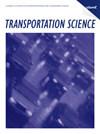快速投递系统中的动态快递能力获取:一种深度q -学习方法
IF 4.8
2区 工程技术
Q1 OPERATIONS RESEARCH & MANAGEMENT SCIENCE
引用次数: 1
摘要
随着最近零工经济的蓬勃发展,城市运输系统的需求大幅增长。在这样的系统中,订单根据交付时间承诺从本地配送点交付给客户。一个重要的例子是餐厅的送餐系统,其送餐时间预计在下单后几分钟内完成。该系统通过利用快递员不断地进行取货和送货来服务订单。操作这样一个快速交付系统是非常具有挑战性的,主要是因为服务期望很高,需求和交付能力都有很大的不确定性。送货商通常根据需求预测来计划送货班次。然而,由于需求的高波动性,在运营期间有时可能需要调整和动态地增加快递员。本文研究了快速配送系统中动态增加快递员容量的问题,并提出了一种深度强化学习方法,以获得一种平衡增加快递员成本和由于配送能力不足而导致的服务质量成本下降的策略。具体来说,我们力求确保高比例的订单在少量的快递时间内按时交付。在送餐领域的一项计算研究表明,学习策略优于代表当前实践的策略,并展示了深度学习在解决高度随机逻辑设置中的操作问题方面的潜力。历史:本文已被《交通科学》专刊《机器学习方法及其在大规模路线规划问题中的应用》接受。资助:本研究得到了国家机构Investigación y Desarrollo[72180404]的支持。补充材料:电子伴侣可在https://doi.org/10.1287/trsc.2022.0042上获得。本文章由计算机程序翻译,如有差异,请以英文原文为准。
Dynamic Courier Capacity Acquisition in Rapid Delivery Systems: A Deep Q-Learning Approach
With the recent boom of the gig economy, urban delivery systems have experienced substantial demand growth. In such systems, orders are delivered to customers from local distribution points respecting a delivery time promise. An important example is a restaurant meal delivery system, where delivery times are expected to be minutes after an order is placed. The system serves orders by making use of couriers that continuously perform pickups and deliveries. Operating such a rapid delivery system is very challenging, primarily because of the high service expectations and the considerable uncertainty in both demand and delivery capacity. Delivery providers typically plan courier shifts for an operating period based on a demand forecast. However, because of the high demand volatility, it may at times during the operating period be necessary to adjust and dynamically add couriers. We study the problem of dynamically adding courier capacity in a rapid delivery system and propose a deep reinforcement-learning approach to obtain a policy that balances the cost of adding couriers and the cost-of-service quality degradation because of insufficient delivery capacity. Specifically, we seek to ensure that a high fraction of orders is delivered on time with a small number of courier hours. A computational study in the meal delivery space shows that a learned policy outperforms policies representing current practice and demonstrates the potential of deep learning for solving operational problems in highly stochastic logistic settings.History: This paper has been accepted for the Transportation Science Special Issue on Machine-Learning Methods and Applications in Large-Scale Route Planning Problems.Funding: This work was supported by Agencia Nacional de Investigación y Desarrollo [72180404].Supplemental Material: The e-companion is available at https://doi.org/10.1287/trsc.2022.0042 .
求助全文
通过发布文献求助,成功后即可免费获取论文全文。
去求助
来源期刊

Transportation Science
工程技术-运筹学与管理科学
CiteScore
8.30
自引率
10.90%
发文量
111
审稿时长
12 months
期刊介绍:
Transportation Science, published quarterly by INFORMS, is the flagship journal of the Transportation Science and Logistics Society of INFORMS. As the foremost scientific journal in the cross-disciplinary operational research field of transportation analysis, Transportation Science publishes high-quality original contributions and surveys on phenomena associated with all modes of transportation, present and prospective, including mainly all levels of planning, design, economic, operational, and social aspects. Transportation Science focuses primarily on fundamental theories, coupled with observational and experimental studies of transportation and logistics phenomena and processes, mathematical models, advanced methodologies and novel applications in transportation and logistics systems analysis, planning and design. The journal covers a broad range of topics that include vehicular and human traffic flow theories, models and their application to traffic operations and management, strategic, tactical, and operational planning of transportation and logistics systems; performance analysis methods and system design and optimization; theories and analysis methods for network and spatial activity interaction, equilibrium and dynamics; economics of transportation system supply and evaluation; methodologies for analysis of transportation user behavior and the demand for transportation and logistics services.
Transportation Science is international in scope, with editors from nations around the globe. The editorial board reflects the diverse interdisciplinary interests of the transportation science and logistics community, with members that hold primary affiliations in engineering (civil, industrial, and aeronautical), physics, economics, applied mathematics, and business.
 求助内容:
求助内容: 应助结果提醒方式:
应助结果提醒方式:


